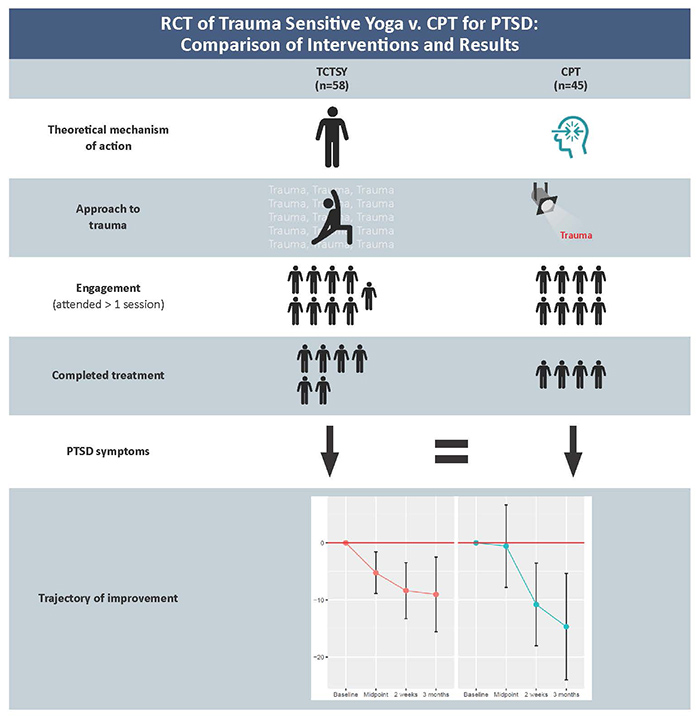
|
|
Research HighlightEvidence for Trauma Sensitive Yoga as a Treatment for PTSD Related to Military Sexual Trauma in Women Veterans: Findings from a 5-year RCTKey Points
Current first-line treatments for PTSD are trauma-focused psychotherapies, specifically prolonged exposure (PE) and cognitive processing therapy (CPT). These therapies have the highest quality evidence for effectiveness, and VA has conducted robust national rollouts of these treatments. However, dropout rates in clinical practice and research are high. As many as one-half do not achieve clinically meaningful improvement, and more than half of those who complete these treatments continue to meet the criteria for PTSD.1 Additionally, well-established barriers to PTSD-treatment seeking among military sexual trauma (MST) survivors (e.g., stigma, institutional betrayal, avoidance of trauma cues) inhibit initial treatment seeking and engagement in these therapies. The need for additional evidence-based treatment options is well recognized. The goal of this study was to address this need for treatment options and barriers to care by investigating a non-trauma-focused, complementary and integrative health (CIH) treatment option for women Veterans with PTSD related to MST. Yoga is widely used in VA and by Veterans in the community for wellness and for clinical conditions and symptoms, including PTSD treatment. In our recent HSR&D-funded study, we sought to determine if yoga, specifically Trauma Center Trauma Sensitive Yoga (TCTSY), could provide similar outcomes to the current gold standard treatment, CPT, for women Veterans with PTSD related to MST. TCTSY was developed specifically for civilian women with chronic PTSD who were survivors of complex trauma, specifically childhood sexual trauma. TCTSY, a Hatha style yoga, focuses on interoception, i.e., the sense of the physiological condition of the body, and addresses themes related to establishing safety, individual choice, being present, and taking effective action.2 TCTSY is a therapeutic intervention for PTSD symptoms and differs from the use of yoga for overall health and well-being, relaxation, or other clinically non-specific purposes. Unlike cognitively-based trauma focused psychotherapies, i.e., PE and CPT, TCTSY is an embodied non-trauma focused PTSD treatment. It is based on trauma theory, attachment theory, and neuroscience. We conducted a five-year randomized controlled trial at the main study site, the Atlanta VAHCS, prior to the COVID-19 pandemic-related shutdowns. We added the VA Portland HCS (Belle Zaccari, PhD, Site PI) in 2020 and conducted all research procedures and intervention sessions virtually due to COVID-19 related restrictions. This report includes only the Atlanta results, where we enrolled 152 women Veterans with PTSD related to MST who were VA users, and retained 103 for the intent to treat analytic sample. The majority of enrolled Veterans were African American (90 percent) – a rarity in yoga studies – and their mean age was 48.4 years. TCTSY-certified facilitators and VA clinicians certified in CPT conducted the interventions in weekly group sessions. We used the Clinician Administered PTSD Scale-5 (CAPS-5) and the PTSD Checklist for DSM-V (PCL-5) to assess current PTSD diagnosis and symptom severity, including overall PTSD and four symptom clusters. Participants completed up to four assessments, from baseline through three months post-intervention. In addition to PTSD symptoms, we assessed commonly associated symptoms (e.g., depression, chronic pain), functioning and quality of life, as well as outcomes related to potential mechanisms of action of yoga, including cytokines and heart rate variability. Analysis of these outcomes is underway, as is the analysis of the outcomes for the Portland site, which will enable us to compare outcomes between face-to-face versus virtual delivery. PTSD OutcomesThe findings reported here are interim results from the Atlanta site. Study dropout after randomization and prior to the first intervention session was higher in the CPT group (20 percent) than in TCTSY (10 percent). Both groups had clinically meaningful decreases (≥ 10 points) in total PTSD symptom severity and all four symptom clusters (criterion scores) on the CAPS-5 and PCL-5 over time in all five multilevel linear models without significant differences between groups.3 Effect sizes for total symptom severity were large for TCTSY and CPT. The TCTSY symptom trajectory of earlier (mid-intervention) and continuous symptom improvement differed from the CPT trajectory, in which symptoms did not significantly improve until two weeks post-intervention. Treatment completion was higher in TCTSY (60 percent; ≥7/10 sessions) than in CPT (38 percent; ≥ 8/12 sessions). DiscussionTCTSY performed equivalently to a current gold-standard treatment, CPT (one modality was no better or worse than the other), supporting TCTSY as an additional evidence-based treatment option for PTSD, specifically for women Veterans with PTSD related to MST. These study results are highly relevant to clinical care and health services delivery and research. Clinical care: TCTSY is not only a viable and effective PTSD treatment option for women Veterans with MST-related PTSD, but also likely could serve as an intervention to increase patient engagement and retention in PTSD treatment, an ongoing challenge in VA. The TCTSY results in the predominantly African American sample in this study broaden the applicability of the findings to an under-studied population. Health services delivery: TCTSY is less costly, easier to deliver, lacks the barriers posed by trauma-focused psychotherapy, and is scalable. Health services research: The next step in establishing TCTSY as an evidence-based nationally available VA PTSD treatment option would be a multi-site implementation science study to evaluate the feasibility of TCTSY implementation in a variety of VA settings, patient engagement, intervention fidelity, treatment completion, and clinical outcomes. Additional studies to investigate TCTSY as a precursor or adjunct to current PTSD psychotherapies are warranted. 
References
|
|